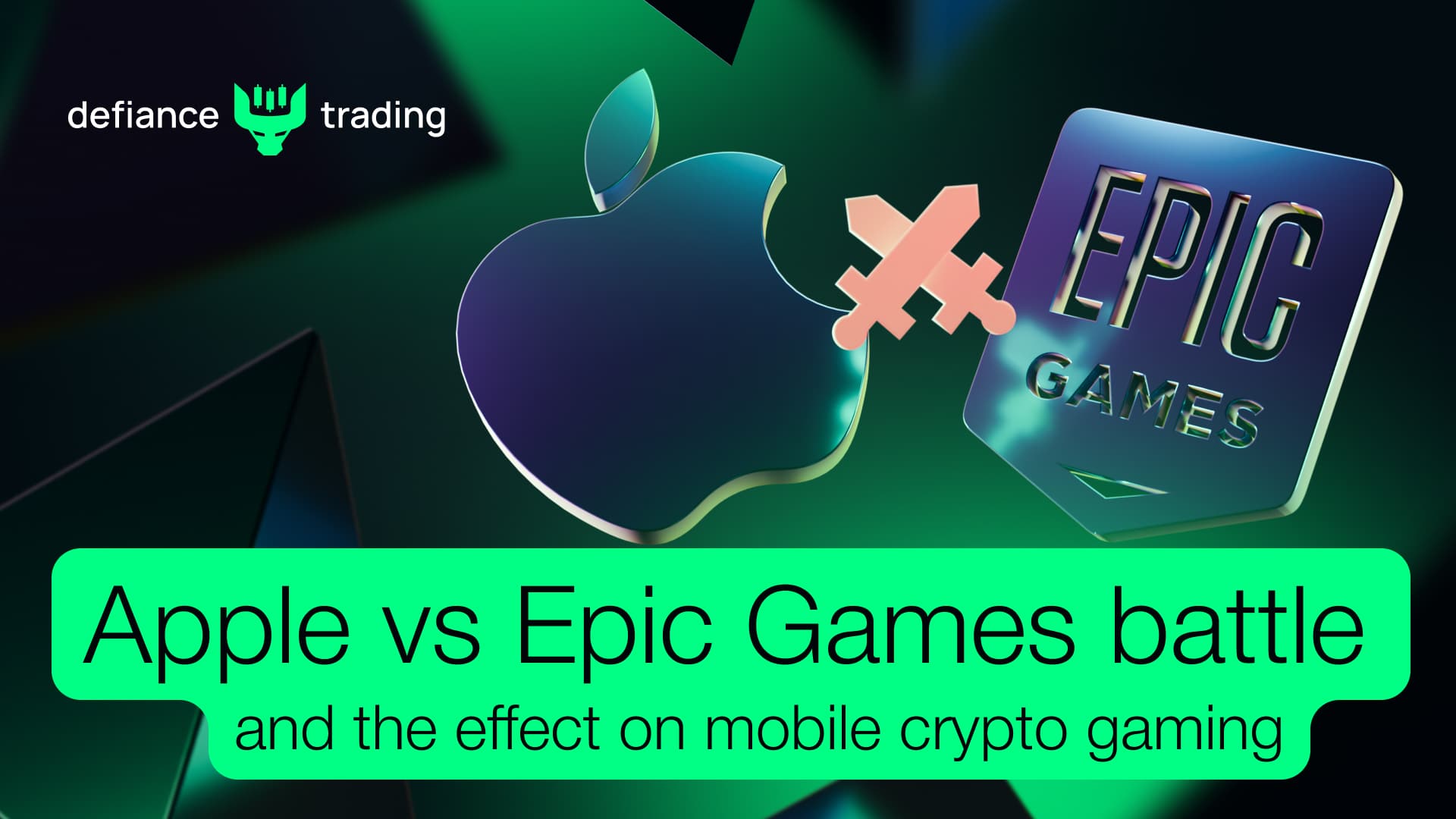Apple vs Epic Games battle and the effect on mobile crypto gaming

You are familiar with Apple, but do you know Epic Games? They are the makers of Fortnite, also popular for Battle Royale. They are also one of the supporters of mobile blockchain gaming and are pushing for a wider adoption of it. What better way to achieve this aim than to embrace traditional gamers?
However, this goal has hit a brick wall: exorbitant cuts from digital stores. Online store providers like Apple and Google have an ecosystem to cater for, and they have a large share of mobile phone users. These power-drunk giants impose heavy commissions on in-app purchases.
This move affects developers in revenue to improve on gaming flow and graphics which goes on to affect how consumers interact with collectibles and their entire experience.
In this article, we will give insights into the Epic vs. Apple court case and how the final verdict impacts mobile crypto gaming.
Let’s dive in!
Apple vs Epic games battle: How it began
Epic Games founder, Tim Sweeny, argued that considering content distribution, an 8% revenue cut is sufficient to run a digital storefront in any region. He said the difference with console makers is that they invest heavily in hardware bits to sell at low costs, and they often partner with game publishers for marketing campaigns. This reasoning led to the invention of Epic Games Stores to operate on a lower commission rate of 12%.
In response, Apple said that App Store’s value reflects the 30% cut from in-app purchases. The company claimed other variables account for this figure beyond features visible on screens.
As Fortnite gained popularity with Battle Royale, Epic released a free-to-play version on Android. To escape Google, the game company provided a sideloading package. These good intentions didn’t meet good reception as many clones jostled to pass for original on Playstore.
By April 2020, Epic discontinued the sideloaded version to address security concerns. IoS does not comply with sideloading, so Epic had to release the game straight to the App Store from 2018.
Timeline of Events leading to Epic’s Victory
In August 2020, Epic went against App Store’s policies. It updated versions of the Fortnite game in IoS and Playstore with alternative payment solutions, bypassing native platform routes. That gave birth to Project Liberty.
This move was the first in a string of attempts to provoke Apple and Google. The alternative payment choices allowed gamers to access a 20% discount when purchasing collectibles. Both tech giants did not take the issue with levity and took Fortnite off their platforms.
Epic went to court, calling Apple’s policies illegal and saying they stifle healthy competition. Apple counter-sued Epic for breaching contract agreements, asking for recompense for lost revenue.
The eventual ruling came in September 2021, and 9 out of 10 counts were in Apple’s favour. Both parties, dissatisfied with this outcome, proceeded to appeal. In April 2023, the Appellate court validated the previous ruling. So, the two entities went to the Supreme Court and the case was finalized in January 2024 when the court retained the initial decision.
This judgement prompted Apple to revise their US App store terms. The fresh terms now allowed developers to inform players about direct and alternative payment options such as cryptocurrency. However, there’s a catch: developers need to ask Apple’s permission to include links. When consumers purchase via a link, within 7 days, Apple gets 27% commission. This slight change sent Epic racing back to court.
In a March 2024 filing, Epic called the changes insufficient and said Apple flouted the court’s injunction. Other tech giants like Meta, X, and Microsoft echoed this stance. This call prompted preliminary findings, and Judge Yvonne Gonzalez ruled in favor of Epic. A hearing followed on May 8th 2024 to evaluate Apple’s compliance to the original judgment.
What does the ruling mean for crypto gaming?
Mobile games will play a bigger role in blockchain gaming
Epic’s Fortnite returns to App Store, and this comeback sets a precedent for new entrants. They can minimize the hold that Apple has over them.
Also, many games possess fantastic PC versions, but how many people move around with laptops? To make gaming truly encompassing, it has to perform well on mobile. Recent research from Game7 shows mobile games hold 55% of blockchain gaming. Expect this figure to tick up soon.
Web 3 levels up on IoS
There’s no more restriction on blockchain marketplaces for iOS users. Other major platforms like Opensea and Metamask have had to tiptoe around the limited functionalities on iOS.
This ruling opens doors for NFT marketplaces and returns power to them with direct purchase buttons for external payments. Users can enjoy an immersive gaming experience without exorbitant fees, and crypto gaming can rub shoulders with traditional gaming.
It is a win for the U.S. smartphone population with increased crypto applications in previously uncharted areas.
Lower fees
Having to spend less encourages users to engage with platforms. Since there are no 30% cuts, more people can explore their curiosities about existing and emerging blockchain projects.
Developers can seek alternatives that beef up profit margins from applications. Also, consumers can pay as low as 12% on other web stores.
This, however, is old news for EU gamers. They have had access to the Epic Games store on IoS since last year. The EU Digital Markets Act compelled Apple to allow Epic launch their store.
On both platforms, the app still takes time to download with issues like confusing settings and “scare screens”. Displays that indicate security threats and system inadequacies are more than enough to discourage potential users. Epic is still fighting this issue in court.
Conclusion
Blockchain’s goal is to break the mould. Until recently, the world has run on monopolies. They still exist, but gradually, these companies have lost their grips on market share.
On the back of calling out Google, Epic has recorded progress with extending their products to Apple users. This success gives them access to a staggering fraction of the US population that runs on iOS.
Although Apple isn’t giving up just yet, Epic has won in Europe with the Digital Markets Act, purchases outside the App Store, and freedom to offer users alternative payment options. How far will Epic go to liberate the gaming industry? Nobody knows, but so far, they’ve done great and mobile blockchain gaming is better for it.
For more updates in cryptocurrency and blockchain, visit our WEBSITE today!
Ready to Defy the Odds?
Become part of a growing movement
